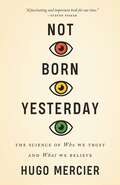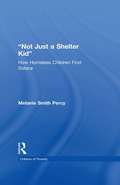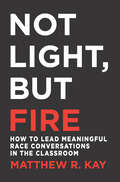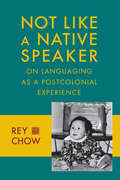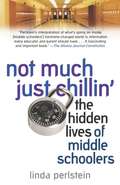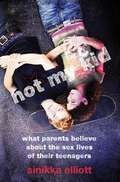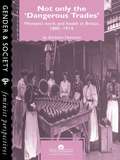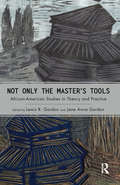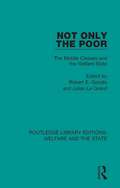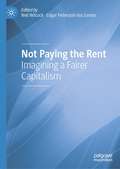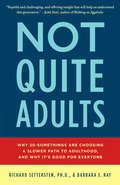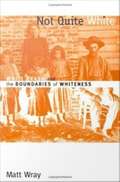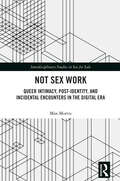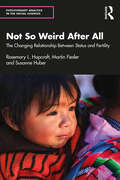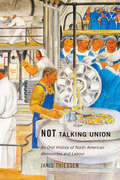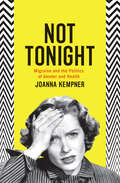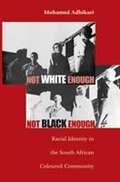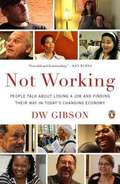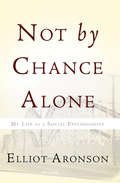- Table View
- List View
Not Born Yesterday: The Science of Who We Trust and What We Believe
by Hugo MercierWhy people are not as gullible as we thinkNot Born Yesterday explains how we decide who we can trust and what we should believe—and argues that we're pretty good at making these decisions. In this lively and provocative book, Hugo Mercier demonstrates how virtually all attempts at mass persuasion—whether by religious leaders, politicians, or advertisers—fail miserably. Drawing on recent findings from political science and other fields ranging from history to anthropology, Mercier shows that the narrative of widespread gullibility, in which a credulous public is easily misled by demagogues and charlatans, is simply wrong.Why is mass persuasion so difficult? Mercier uses the latest findings from experimental psychology to show how each of us is endowed with sophisticated cognitive mechanisms of open vigilance. Computing a variety of cues, these mechanisms enable us to be on guard against harmful beliefs, while being open enough to change our minds when presented with the right evidence. Even failures—when we accept false confessions, spread wild rumors, or fall for quack medicine—are better explained as bugs in otherwise well-functioning cognitive mechanisms than as symptoms of general gullibility.Not Born Yesterday shows how we filter the flow of information that surrounds us, argues that we do it well, and explains how we can do it better still.
Not Buying It: My Year Without Shopping
by Judith LevineMany of us have tried to call a halt to our spending at one time or another. But what if we decided not to buy anything for a whole year? Obviously, we would need necessities like food and soap, but how would be manage without new clothes, treats, entertainment?Funny, smart and self-deprecating,Not Buying Itis a close look at our society's obsession with shopping and the cold turkey confession of a woman we can all identify with -- someone who can't live without French roast coffee andexpensive wool socks, but who has had enough of spending money for the sake of it. Without consumer goods and experiences, Levine and her partner Paul pursue their careers, nurture family relationships and try to keep their sanity and humour intact. Tracking their progress and lapses, she contemplates the meanings of need and desire, scarcity and security, consumerism and citizenship. She asks the big questions -- can the economy survive without shopping? Are Q-tips a necessity?A thought-provoking account of the pleasures and perils of the purchase-driven life,Not Buying Itwill get readers talking about their reliance on the act of buying and the possibility of getting off the merry-go-round.
Not Just Roommates: Cohabitation after the Sexual Revolution
by Elizabeth H. PleckThe late twentieth century has seen a fantastic expansion of personal, sexual, and domestic liberties in the United States. In Not Just Roommates, Elizabeth H. Pleck explores the rise of cohabitation, and the changing social norms that have allowed cohabitation to become the chosen lifestyle of more than fifteen million Americans. Despite this growing social acceptance, Pleck contends that when it comes to the law, cohabitors have been, and continue to be, treated as second-class citizens, subjected to discriminatory laws, limited privacy, a lack of political representation, and little hope for change. Because cohabitation is not a sexual identity, Pleck argues, cohabitors face the legal discrimination of a population with no group identity, no civil rights movement, no legal defense organizations, and, often, no consciousness of being discriminated against. Through in-depth research in written sources and interviews, Pleck shines a light on the emergence of cohabitation in American culture, its complex history, and its unpleasant realities in the present day.
Not Just Roommates: Cohabitation after the Sexual Revolution
by Elizabeth H. PleckThe late twentieth century has seen a fantastic expansion of personal, sexual, and domestic liberties in the United States. In Not Just Roommates, Elizabeth H. Pleck explores the rise of cohabitation, and the changing social norms that have allowed cohabitation to become the chosen lifestyle of more than fifteen million Americans. Despite this growing social acceptance, Pleck contends that when it comes to the law, cohabitors have been, and continue to be, treated as second-class citizens, subjected to discriminatory laws, limited privacy, a lack of political representation, and little hope for change. Because cohabitation is not a sexual identity, Pleck argues, cohabitors face the legal discrimination of a population with no group identity, no civil rights movement, no legal defense organizations, and, often, no consciousness of being discriminated against. Through in-depth research in written sources and interviews, Pleck shines a light on the emergence of cohabitation in American culture, its complex history, and its unpleasant realities in the present day.
Not Just a Shelter Kid: How Homeless Children Find Solace (Children of Poverty)
by Melanie S. PercyFirst published in 1997. Routledge is an imprint of Taylor & Francis, an informa company.
Not Light, but Fire: How to Lead Meaningful Race Conversations in the Classroom
by Matthew KayDo you know how to initiate and facilitate productive dialogues about race in your classroom? Are you prepared to handle complex topics while keeping your students engaged?Inspired by Frederick Douglass's abolitionist call to action, it is not light that is needed, but fire-, author Matthew Kay demonstrateshow to move beyond surface-level discussionsand lead students through the most difficult race conversations. In Not Light, But Fire: How to Lead Meaningful Race Conversations in the Classroom, Kay recognizes we often never graduate to the harder conversations,so he offers a method for getting them right, providing candid guidance on: How torecognize the difference between meaningful and inconsequential race conversations.How tobuild conversational safe spaces,- not merely declare them.How toinfuse race conversations with urgency and purpose.How tothrive in the face of unexpected challenges.How administrators mightequip teachers to thoughtfully engage in these conversations.With the right blend of reflection and humility, Kay assertsteachers can make school one of the best venues for young people to discuss race.
Not Like a Native Speaker: On Languaging as a Postcolonial Experience
by Rey ChowRey Chow is Anne Firor Scott Professor of Literature at Duke University and the author of numerous influential books, including several published by Columbia University Press: Primitive Passions; The Protestant Ethnic and the Spirit of Capitalism; and Sentimental Fabulations, Contemporary Chinese Films. A book about her writings, The Rey Chow Reader, was edited by Paul Bowman. Her work has appeared in more than ten languages.
Not Much Just Chillin': The Hidden Lives of Middle Schoolers
by Linda PerlsteinSuddenly they go from striving for A's to barely passing, from fretting about cooties to obsessing for hours about crushes. Former chatterboxes answer in monosyllables; freethinkers mimic everything from clothes to opinions. Their bodies and psyches morph through the most radical changes since infancy. They are kids in the middle-school years, the age every adult remembers well enough to dread. Here at last is an up-to-date anthropology of this critically formative period. Prize-winning education reporter Linda Perlstein spent a year immersed in the lunchroom, classrooms, hearts, and minds of a group of suburban Maryland middle schoolers and emerged with this pathbreaking account. Perlstein reveals what's really going on under kids' don't-touch-me facade while they grapple with schoolwork, puberty, romance, and identity. A must-read for parents and educators, Not Much Just Chillin' offers a trail map to the baffling no-man's-land between child and teen.
Not My Kid: What Parents Believe about the Sex Lives of Their Teenagers
by Sinikka ElliottTeenagers have sex. While almost all parents understand that many teenagers are sexually active, there is a paradox in many parents’ thinking: they insist their own teen children are not sexual, but characterize their children’s peers as sexually-driven and hypersexual. Rather than accuse parents of being in denial, Sinikka Elliott teases out the complex dynamics behind this thinking, demonstrating that it is rooted in fears and anxieties about being a good parent, the risks of teen sexual activity, and teenagers’ future economic and social status. Parents—like most Americans—equate teen sexuality with heartache, disease, pregnancy, promiscuity, and deviance and want their teen children to be protected from these things.Going beyond the hype and controversy, Elliott examines how a diverse group of American parents of teenagers understand teen sexuality, showing that, in contrast to the idea that parents are polarized in their beliefs, parents are confused, anxious, and ambivalent about teen sexual activity and how best to guide their own children’s sexuality. Framed with an eye to the debates about teenage abstinence and sex education in school, Elliott also links parents’ understandings to the contradictory messages and broad moral panic around child and teen sexuality. Ultimately, Elliott considers the social and cultural conditions that might make it easier for parents to talk with their teens about sex, calling for new ways of thinking and talking about teen sexuality that promote social justice and empower parents to embrace their children as fully sexual subjects.
Not Only The Dangerous Trades: Women's Work And Health In Britain 1880-1914 (Gender And Society Ser.)
by Barbara HarrisonUsing original research and focusing on occupational ill-health in relation to women workers, this book presents a perspective for the analysis of both gender and work and work and ill-health. The author gives a critique of traditional theoretical accounts of gender relations, state intervention and industrial ill-health. The chapters examine the extent to which feminist activists got involved in debates about health and industrial work, and show how activists went beyond the concerns of suffrage.; The book presents a historical period which was marked by a change in the role of the state with respect to intervention in industrial conditions, and analyses the coincidence of this with three other significant developments: the growth of expertise in industrial disease; the employment of women in the factory to take on responsibilities in relation to other women; and changes in the direction of feminist activism. In light of this analysis, the author suggests that some theoretical approaches to both gender relations and health and safety requirements require modification.
Not Only the Master's Tools: African American Studies in Theory and Practice
by Lewis R. Gordon Jane Anna GordonNot Only the Master's Tools brings together new essays on African American studies. It is ideal for students and scholars of African studies, philosophy, literary theory, educational theory, social and political thought, and postcolonial studies.
Not Only the Poor: The Middle Classes and the Welfare State (Routledge Library Editions: Welfare and the State #5)
by Julian Le Grand Robert E. GoodinOriginally published in 1987 Not Only the Poor explores the self-interested involvement of the non-poor in the welfare state, particularly the middle class. Using evidence from Britain, America, and Australia, they show that the non-poor were crucial in the founding of the welfare state, and in all three countries the non-poor benefit extensively from key welfare programmes, including those ostensibly targeted on the poor. Goodin and Le Grand conclude that the beneficial involvement of the non-poor in the welfare state is probably inevitable, but this may be no bad thing, depending on the alternative and on the nature of the egalitarian ideal adopted.
Not Paying the Rent: Imagining a Fairer Capitalism
by Neil Wilcock Edgar Federzoni dos SantosThis is a conversational book with chapters directly followed by responses from experts. The main authors propose that the failure in development is not due to capitalism but rather rentism, which is earnings based on political rather market returns. Rent prevents development and ingrains social and economic inequalities. Using the case study of Brazil’s economic development, it is shown how development fails because policies Brazil and other low to middle-income countries promote do not overcome the main obstacle to development - rent. The overcoming of rent would occur within a model of globalisation whereby the advanced economics still prosper concurrently as the poorest countries grow, all underpinned by international organisations defending a rule-based globalisation. Not Paying the Rent: Imagining a Fairer Capitalism presents a new application of the theory of rent, both historically in the case of Brazil, and in practical terms in tackling it through modern international organisations. It will be relevant to students, researchers, and general readers interested in inequality and development economics.
Not Quite Adults: Why 20-Somethings Are Choosing a Slower Path to Adulthood, and Why It's Good for Everyone
by Richard Settersten Barbara E. RayWhy are 20-somethings delaying adulthood? The media have flooded us with negative headlines about this generation, from their sense of entitlement to their immaturity. Drawing on almost a decade of cutting-edge research and nearly five hundred interviews with young people, Richard Settersten, Ph. D. , and Barbara E. Ray shatter these stereotypes, revealing an unexpected truth: A slower path to adulthood is good for all of us. Their surprising findings include " Young adults who finish college and delay marriage and child-rearing get a much better start in life. " Few 20-somethings who live at home are mooching off their parents. More often, they are using the time at home to gain necessary credentials and save money for a more secure future. " Helicopter parents aren#x19;t so bad after all. Involved parents provide young people with advantages, including mentoring and economic support, that have become increasingly necessary to success. Not Quite Adultsis a fascinating look at an often misunderstood generation. It#x19;s a must-read for parents, teachers, psychologists, sociologists, and anyone interested in today#x19;s youth culture.
Not Quite White: White Trash and the Boundaries of Whiteness
by Matt WrayWhite trash. The phrase conjures up images of dirty rural folk who are poor, ignorant, violent, and incestuous. But where did this stigmatizing phrase come from? And why do these stereotypes persist? Matt Wray answers these and other questions by delving into the long history behind this term of abuse and others like it. Ranging from the early 1700s to the early 1900s, Not Quite White documents the origins and transformations of the multiple meanings projected onto poor rural whites in the United States. Wray draws on a wide variety of primary sources--literary texts, folklore, diaries and journals, medical and scientific articles, social scientific analyses--to construct a dense archive of changing collective representations of poor whites. Of crucial importance are the ideas about poor whites that circulated through early-twentieth-century public health campaigns, such as hookworm eradication and eugenic reforms. In these crusades, impoverished whites, particularly but not exclusively in the American South, were targeted for interventions by sanitarians who viewed them as "filthy, lazy crackers" in need of racial uplift and by eugenicists who viewed them as a "feebleminded menace" to the white race, threats that needed to be confined and involuntarily sterilized. Part historical inquiry and part sociological investigation, Not Quite White demonstrates the power of social categories and boundaries to shape social relationships and institutions, to invent groups where none exist, and to influence policies and legislation that end up harming the very people they aim to help. It illuminates not only the cultural significance and consequences of poor white stereotypes but also how dominant whites exploited and expanded these stereotypes to bolster and defend their own fragile claims to whiteness.
Not Sex Work: Queer Intimacy, Post-identity, and Incidental Encounters in the Digital Era (Interdisciplinary Studies in Sex for Sale)
by Max MorrisThis book explores the parallel histories and intersecting politics of LGBTQ+ people and sex workers, including the role of digital media in shaping the experiences of both in the early twenty-first century. Drawing on the first empirical study with gay, bisexual, and queer young men who agreed to sell sex online without advertising or identifying as sex workers, it examines what the term ‘incidental sex work’ means. Adopting queer methods and feminist theories to explore how definitions of ‘sex’ and ‘work’ have become increasingly unstable in the digital era, it considers how casual, occasional, and unprofessional forms of sex work are arranged on different platforms, from Grindr to OnlyFans. This book will appeal to students and researchers studying sex work and social media across a wide range of fields. It will also be useful for campaigners, policymakers, and healthcare practitioners interested in the implications of incidental sex work.
Not So Weird After All: The Changing Relationship Between Status and Fertility (Evolutionary Analysis in the Social Sciences)
by Rosemary L. Hopcroft Martin Fieder Susanne HuberThis is the first book to fully examine, from an evolutionary point of view, the association of social status and fertility in human societies before, during, and after the demographic transition. In most nonhuman social species, social status or relative rank in a social group is positively associated with the number of offspring, with high-status individuals typically having more offspring than low-status individuals. However, humans appear to be different. As societies have gotten richer, fertility has dipped to unprecedented lows, with some developed societies now at or below replacement fertility. Within rich societies, women in higher-income families often have fewer children than women in lower-income families. Evolutionary theory suggests that the relationship between social status and fertility is likely to be somewhat different for men and women, so it is important to examine this relationship for men and women separately. When this is done, the positive association between individual social status and fertility is often clear in less-developed, pre-transitional societies, particularly for men. Once the demographic transition begins, it is elite families, particularly the women of elite families, who lead the way in fertility decline. Post-transition, the evidence from a variety of developed societies in Europe, North America and East Asia is that high-status men (particularly men with high personal income) do have more children on average than lower-status men. The reverse is often true of women, although there is evidence that this is changing in Nordic countries. The implications of these observations for evolutionary theory are also discussed. This book will be of interest to students and researchers in the social sciences with an interest in evolutionary sociology, evolutionary anthropology, evolutionary psychology, demography, and fertility.
Not Talking Union: An Oral History of North American Mennonites and Labour
by Janis ThiessenHow does one write a labour history of a people who have not been involved in the labour movement in significant numbers and, historically, have opposed union membership? While North American Mennonites have traditionally been associated with rural life, in light of the adjustments demanded by post-1945 urbanization and industrialization, they in fact became very involved in the workforce at a time of important labour foment. Drawing on over a hundred interviews, Janis Thiessen explores Mennonite responses to labour movements such as Cesar Chavez and the United Farm Workers, as well as Mennonite involvement in conscientious objection to unions. This innovative study of the Mennonites - a people at once united by an ethnic and religious identity, yet also shaped by differences in geography, immigration histories, denomination, and class position - provides insights into how and why they have resisted involvement in organized labour. Not Talking Union adds a unique perspective to the history of labour, exploring how people negotiate tensions between their commitments to faith and conscience and the demands of their employment. Not Talking Union breaks new methodological ground in its close analysis of the oral narratives of North American Mennonites. Reflecting on both oral and archival sources, Thiessen shows why Mennonite labour history matters, and reveals the role of power and inequality in that history.
Not Talking Union: An Oral History of North American Mennonites and Labour
by Janis ThiessenHow does one write a labour history of a people who have not been involved in the labour movement in significant numbers and, historically, have opposed union membership? While North American Mennonites have traditionally been associated with rural life, in light of the adjustments demanded by post-1945 urbanization and industrialization, they in fact became very involved in the workforce at a time of important labour foment. Drawing on over a hundred interviews, Janis Thiessen explores Mennonite responses to labour movements such as Cesar Chavez and the United Farm Workers, as well as Mennonite involvement in conscientious objection to unions. This innovative study of the Mennonites - a people at once united by an ethnic and religious identity, yet also shaped by differences in geography, immigration histories, denomination, and class position - provides insights into how and why they have resisted involvement in organized labour. Not Talking Union adds a unique perspective to the history of labour, exploring how people negotiate tensions between their commitments to faith and conscience and the demands of their employment. Not Talking Union breaks new methodological ground in its close analysis of the oral narratives of North American Mennonites. Reflecting on both oral and archival sources, Thiessen shows why Mennonite labour history matters, and reveals the role of power and inequality in that history.
Not Tonight: Migraine and the Politics of Gender and Health
by Joanna Kempner&“[An] insightful and eloquent account of our evolving understandings of migraine, from a condition of weak-nerved women, to a &‘real&’…disease&” (Elizabeth Mitchell Armstrong Princeton University). Pain. Vomiting. Hours and days spent lying in the dark. Migraine is an extraordinarily common, disabling, and painful disorder that affects over 36 million Americans and costs the US economy at least $32 billion per year. Nevertheless, it is a frequently dismissed, ignored, and delegitimized condition. In Not Tonight, sociologist Joanna Kempner argues that this general dismissal of migraine can be traced back to the gendered social values embedded in the way we talk about, understand, and care for people in pain. The symptoms that accompany headache disorders—like head pain, visual auras, and sensitivity to sound—lack objective markers of distress that can confirm their existence. Therefore, doctors must rely on the perceived moral character of their patients to gauge how serious their complaints are. Kempner shows how this subjective dimension of diagnosis has shaped the history of migraine. In the nineteenth-century, migraine was seen as a disorder of upper-class intellectual men and hysterical women. In the 1940s, the concept of &“migraine personality&” developed, in which women with migraine were described as uptight neurotics who withheld sex. Even today, we see depictions of people with highly sensitive &“migraine brains.&” Not Tonight casts new light on how cultural beliefs about gender, pain, and the distinction between mind and body influence not only whose suffering we legitimate, but which remedies are marketed, how medicine is practiced, and how knowledge about disease is produced.
Not Under My Roof: Parents, Teens, and the Culture of Sex
by Amy T. SchaletWinner of the Healthy Teen Network’s Carol Mendez Cassell Award for Excellence in Sexuality Education and the American Sociological Association's Children and Youth Section's 2012 Distinguished Scholarly Research Award For American parents, teenage sex is something to be feared and forbidden: most would never consider allowing their children to have sex at home, and sex is a frequent source of family conflict. In the Netherlands, where teenage pregnancies are far less frequent than in the United States, parents aim above all for family cohesiveness, often permitting young couples to sleep together and providing them with contraceptives. Drawing on extensive interviews with parents and teens, Not Under My Roof offers an unprecedented, intimate account of the different ways that girls and boys in both countries negotiate love, lust, and growing up. Tracing the roots of the parents’ divergent attitudes, Amy T. Schalet reveals how they grow out of their respective conceptions of the self, relationships, gender, autonomy, and authority. She provides a probing analysis of the way family culture shapes not just sex but also alcohol consumption and parent-teen relationships. Avoiding caricatures of permissive Europeans and puritanical Americans, Schalet shows that the Dutch require self-control from teens and parents, while Americans guide their children toward autonomous adulthood at the expense of the family bond.
Not White Enough, Not Black Enough: Racial Identity in the South African Coloured Community
by Mohamed AdhikariThis book is the first systematic study of Coloured identity, its history, and its relevance to South African national life. The author engages with the debates and controversies thrown up by the identity’s troubled existence and challenges much of the conventional wisdom associated with it. A combination of wide-ranging thematic analyses and detailed case studies illustrates how Colouredness functioned as a social identity from the time of its emergence in the late nineteenth century through its adaptation to the postapartheid environment. <p><p> The author demonstrates how the interplay of marginality, racial hierarchy, assimilationist aspirations, negative racial stereotyping, class divisions, and ideological conflicts helped mold people’s sense of Colouredness over the past century. Knowledge of this history, and of the social and political dynamic that informed the articulation of a separate Coloured identity, is vital to an understanding of present-day complexities in South Africa.
Not Working
by Dw GibsonPoignant true stories of resilience, determination, and the search for fulfillment Inspired by Studs Terkel's Working and by James Agee and Walker Evans' Let Us Now Praise Famous Men, DW Gibson sets off on a journey across the United States to interview Americans who have lost their jobs. Here is the mortgage broker who arrived at work to find the door to his office building padlocked, the human resources executive who laid off a couple hundred people before being laid off herself, the husband who was laid off two weeks after his wife learned she was pregnant, the wife who was forced to lay off her husband. In telling the stories of people who could be our neighbors, our friends, our relatives, Not Working holds up a mirror to our times, showing us the individuals behind the unemployment statistics--their fears and hopes--and offering a map for navigating our changing economy. With an extraordinary mix of pathos, anger, solidarity, and humor, it brings clarity--and humanity--to the national conversation. For information about the companion documentary film, Not Working: The Pulse of the Great Recession, please visit ffh.films.com/title/55494.
Not by Bread Alone: Social Support in the New Russia
by Melissa L. CaldwellThe book addresses the phenomenon of poverty in Russian today through an ethnography of a transnational soup kitchen community in Moscow.
Not by Chance Alone: My Life as a Social Psychologist
by Elliot AronsonHow does a boy from a financially and intellectually impoverished background grow up to become a Harvard researcher, win international acclaim for his groundbreaking work, and catch fire as a pioneering psychologist? As the only person in the history of the American Psychological Association to have won all three of its highest honors--for distinguished research, teaching, and writing-- Elliot Aronson is living proof that humans are capable of capturing the power of the situation and conquering the prison of personality. A personal and compelling look into Aronson’s profound contributions to the field of social psychology, Not by Chance Alone is a lifelong story of human potential and the power of social change.
